By Minnie Marie Hayes

Rihanna
The Superbowl started it.
My pre-teen granddaughters got so excited … then showed up only at halftime. They hooted and giggled over commercials, but … screaming and floor-flopping… the BIG moment was, not football, but RIHANNA! Her first appearance in two years.
Rihanna who? I watched to see whomever they loved. I prefer classical music, but was this music at all? A half hour of stomach caressing and announcement that she hadn’t just gotten fat, but pregnant? Her few exertions to high notes sounded, forgive me, screechy. And caressing her crotch on national TV? Please. What did this have to do with football?
My granddaughter defended her. Rihanna came from Barbados at 15, uneducated and penniless, got hit songs and dances, even created a line of cosmetics that made her a billionaire.
Well, maybe. But caressing her crotch on national TV? My granddaughter allowed that Super Bowl may not have been her best night, but that Rihanna was a good singer.
I said, “Rihanna can’t carry a tune.”
“OK,” she countered, “Who’s YOUR favorite singer?”
I blanked out. I couldn’t think of a single pop name. I am musical: fourteen years of piano, ten of ballet, and I still plan to learn the snare drum. There’s no kind of music I don’t like except progressive jazz, which sounds to me like practicing scales. But pop singers? Seems to me most do more screaming than singing. My mind spun through outer space. I couldn’t think of a single name.
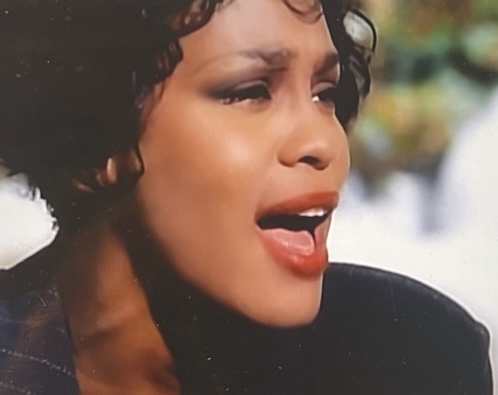
Whitney Houston
Then, right at the dinner table, a fork on the way to my mouth, a pure ethereal voice hung high, like mist in my memory. Just remembering it made hair raise up on my arms, my breath stop: “I-I-I … will always love … you u u…”: Whitney Houston. Like prayer.
Later, I wondered: What made a star of this Rihanna—not the highest note or widest range, obviously. Did carrying a tune without slipping off-key require perfect pitch, or even matter? Or did major stars always bring something no one had ever heard? What makes any singer a star?
Well, Wikipedia lists sales. Not updated to include Taylor Swift in 2023-4, but no one comes close to the Beatles with twenty best-selling hits, sales of over $600 Million, and the most records sold, Ever: 1.6 Billion; Elvis follows with his guitar and hips; next “King of Pop” Michael Jackson doing his moonwalk; then a switch to the ‘material girl’, Madonna, who claims $250M in sales. Rihanna lists $230M in sales, edging out Bob Dylan, Mariah Carey, Whitney Houston and Taylor Swift (Wikipedia gives pre-2023 count for earlier Swift). The last four singers list only $200Million in sales to Rihanna’s $230M. This represents ‘claimed sales’ and ignores inflation, so who knows, but the lists ring true enough.
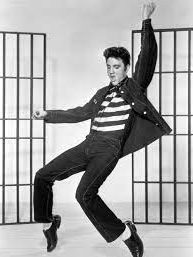
Elvis
Does a common denominator arise in their music? Of course voice matters, but is it highest notes or widest ranges that create a sensation? The highest note by a human, according to The Guinness Book of Records, belongs to a singer most have never heard of, an Italian Brazilian singer, Georgia Brown. Brown reaches an incredible G-10, over six octaves higher than the top of the piano, 25,000 vibrations per second peppering the human ear. Humans can’t even hear it. Only dogs.
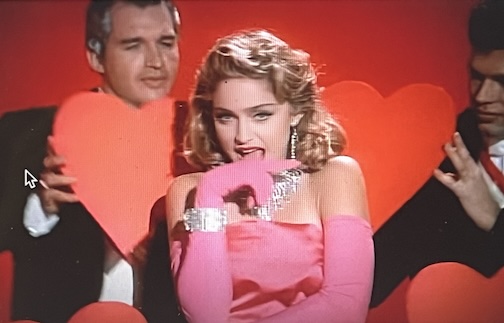
Similarly, the world record for widest range belongs to somewhat-known Tim Storm, who can sing ten octaves. His lowest note vibrates at seven octaves below the bottom note on a full piano board of keys. Tim Storm’s G-minus-7-octave vibrates less than once every five seconds. Humans can’t hear that either. Storm says he can’t hear it himself, but he can feel in in his vocal cords when he’s singing it. Only elephants can hear that note.
Dogs? Elephants? What about Peoples?
Sound physically strikes the ear. Vocal cords produce an acoustic wave which hits the air. Each air molecule vibrates back and forth, hitting the molecule next to it, which also vibrates and hits others, and so forth, hitting anything nearby. Us. The more vibrations per seconds, the higher the note.
Mariah Carey packs theaters to hear her flute-like E7, ‘whistle’ range, the highest. Compared to an adult male voice at about 85Hz or vibrations per second, much less a typical soprano frequency of 1500Hz or vibrations, Mariah Carey’s whistle tone hits an ear with 2,637 vibrations per second. After ‘whistle’, it’s dogs and elephants.
What does that kind of vibration do to an audience?
I’ll tell you what. Let me share an experience.
I prefer sitting as far up to the stage as I can, in the performer’s laps. Sitting in the third row once, I experienced a voice so high, so pure and clear, and held perfectly for so long–almost a full long minute–that it electrified the air, my skin. My earrings buzzed until they swung. The audience didn’t breathe. Silence, then an explosion of cheers. The Chicago Tribune gave the moment first-page coverage.
I always thought it was just an expression, but this was the single time, in my entire life, that I heard a human voice electrify the air so long it could have broken glass. That was Leontyne Price, the first African American soprano to gain international acclaim on the opera and concert stage, performing from 1952 to 1997.
That night at Leontyne Pride’s feet, I felt what the air did to my body, a physical surf. The audience became part of the moment, not spectators. Spiritual in its way, singing is, after all, an ancient probably pre-humanoid means of expressing more than the self can contain. A listener can feel the unseen touch of sound, a kind of magic. No wonder Shamans held such sway over early civilizations.
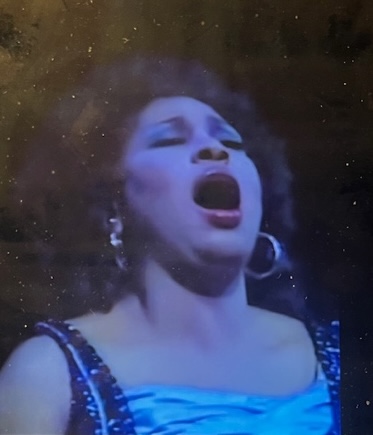
Leontyne Price
Low tones, or a wide range of octaves, affect us too. Think of a Johnny Cash finale with Cash stamping his deep baritone through the floor. Rihanna uses 3.5 octaves and in a heavy belt can go up to B5 at 990Hz— even if some, like me, claim she can’t do it on-key. She also sings a sexy low C3, a full octave below speaking voice, where most female singers struggle.
Whitney Houston’s five octaves, incredibly emotive, required a superhuman vocal stamina and musicianship. Fully capable of opera had she chosen, Houston could easily pop up to D6, 1200Hz, almost 4 times the frequency of a speaking voice. And she too would hold that note for as long a full 60 seconds—a Shaman, close-your-eyes-and feel-it moment. Mariah Carey leaves every singer behind by a full octave and can also fill in the musical line with a quick key change, runs, trills, leaps, scatting and then she’ll pop up to that high floating whistle note. Carey’s voice is phenomenal. I’ve seen Mariah Carey and Whitney Houston on stage together and Houston visibly backs away from trying her own high notes, not allowing Carey the chance to fly above her effortlessly- — with a beautiful smile.
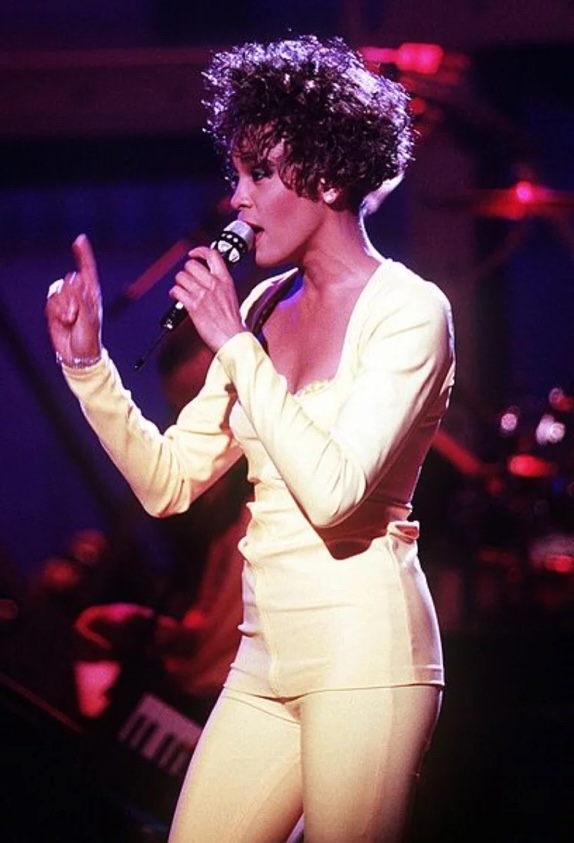
Whitney Houston
A big surprise, for me anyway, Leontyne Price‘s cousins were Dianne Warwick and Whitney Houston. Wow. What genes, right? Perhaps, but something else sets apart Houston, Warwick, even Mariah Carey–but not Taylor Swift or Rihanna. Elvis had it, as did Michael Jackson, Madonna, and Wolfgang Amadeus Mozart. They could carry a tune without missing a beat. Perfect Pitch exceeds the skill of most musicians. Only about 10% have it. Dizzy Gillespie, playing licks for Ella Fitzgerald, said. “She nailed it, note for note, every time.” Musicians tuned instruments to her voice.
Scientists claim perfect pitch can’t be inherited. Dionne Warwick, Whitney Houston and Leontyne Price, all cousins, could have inherited vocal cords, larynx and mouth cavities, physical things. But perfect pitch requires more. All the cousins grew up in musical homes, singing in gospel choirs as children, developing breath support, coordination, agility, and dynamic range. Dionne Warwick’s musical memory enabled her to play piano for the New Hope Baptist Choir at only six years old.
“I come from a gospel-singing family,” Warwick says and insists she didn’t have a showbusiness upbringing. “We grew up like normal people. Went to school like everybody else did. Did my homework and did the dishes as I had to. I had a normal life.” Both Warwick and her cousin Whitney Houston grew up surrounded by soul, gospel, pop, dance-pop, Rhythm and Blues, Mo Town and Michael Jackson’s moonwalk. The cousins each produced their own first hits at 14.
Neurologists insist perfect pitch develops in very early childhood, often by accident. It is learned like language, through repeated exposure to the notes and their names. Scientists’ research of brain plasticity finds that before the age of two the growing brain cells pick up and store language and music heard in those years. Some even insist that gaining perfect pitch is impossible after the age of six, and one researcher claims it’s never been found in a child exposed to music after nine. Surely constantly hearing such an evolving range of music from birth affected that window of brain plasticity in Price, Warwick, and Houston. Mariah Carey was four when her mother discovered she had perfect pitch.
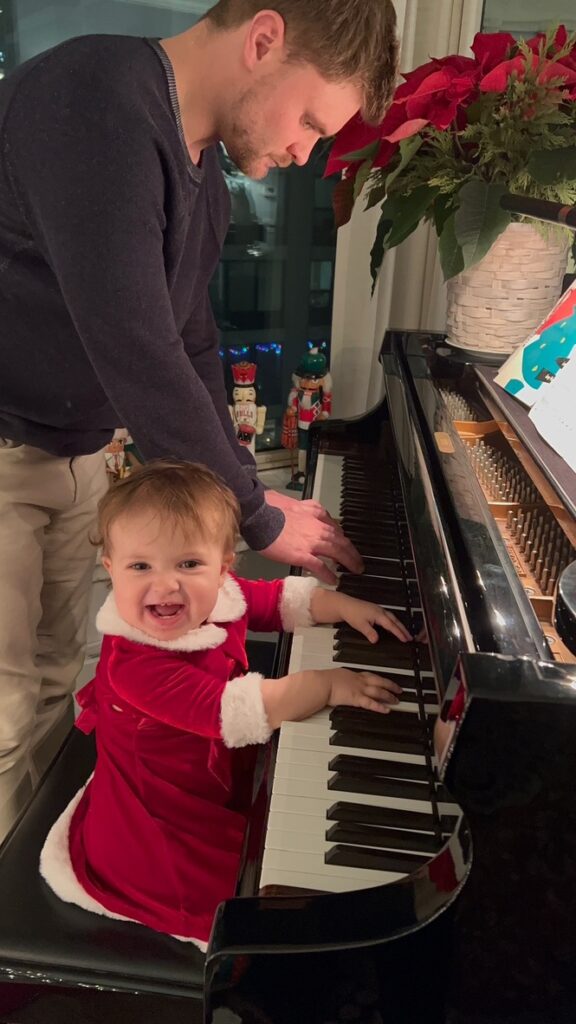
Uncle Goose and Little Lion
Turns out, none of this matters. By unanimous, backseat of the car vote, my pre-teen granddaughters and their friends pronounced Taylor Swift the all-out best of the best. Swift ranges only three, perhaps three and a half octaves, a generous if not spectacular range of 35 notes, no whistle note. Swift does sing music she composes herself, combining country and folk storytelling with rock, with a kind-of rap telling sometimes ten-minute love songs—an intimate Taylor Swift tête-à-tête with each member of the audience. Besides, Taylor campaigns against bullying, which turns out to be an extra appeal to my pre-teen granddaughters.
What’s bullying got to do with it?
Quite a bit, it turns out.
Sculpture, literature, music—all art emerges from history–a chicken and egg thing. Music goes as far back as we can guess about such a natural form of expression. Wolves howl. Owls hoot. We sang around the fire, or in the fields.
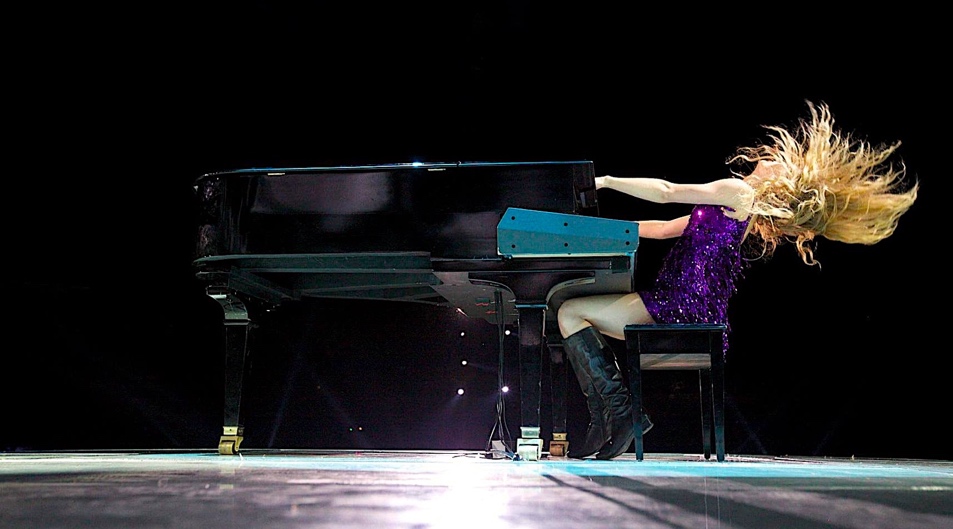
Taylor Swift
Music too reinvents itself. Someone startles audiences with surprising musical phrasing, unusual voices, or an ability to trigger emotional release that strikes a cultural chord—a Taylor Swift chord like bullying and resurrection, say. Music comes from inside.
This weekend rapper singer SZA with Kendrick Lamar follow Rihanna’s Caribbean sensuality to perform at the 2025 Superbowl. Another blip in our historical moment, but what blip? Where will SZA and Kendrick Lamar take us in 2025?
(CONTINUED POST SUPERBOWL)







